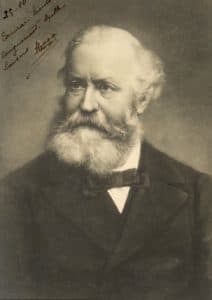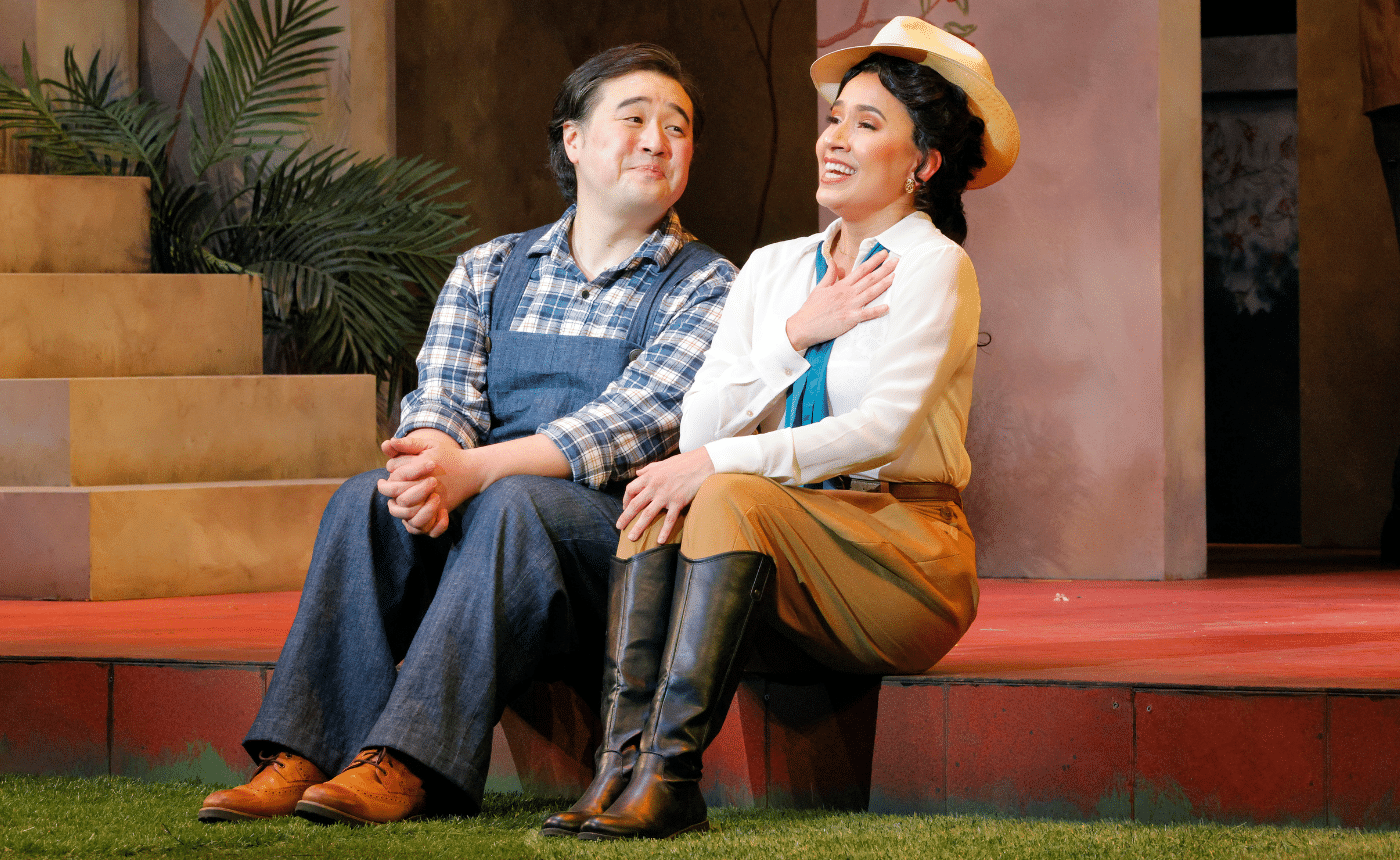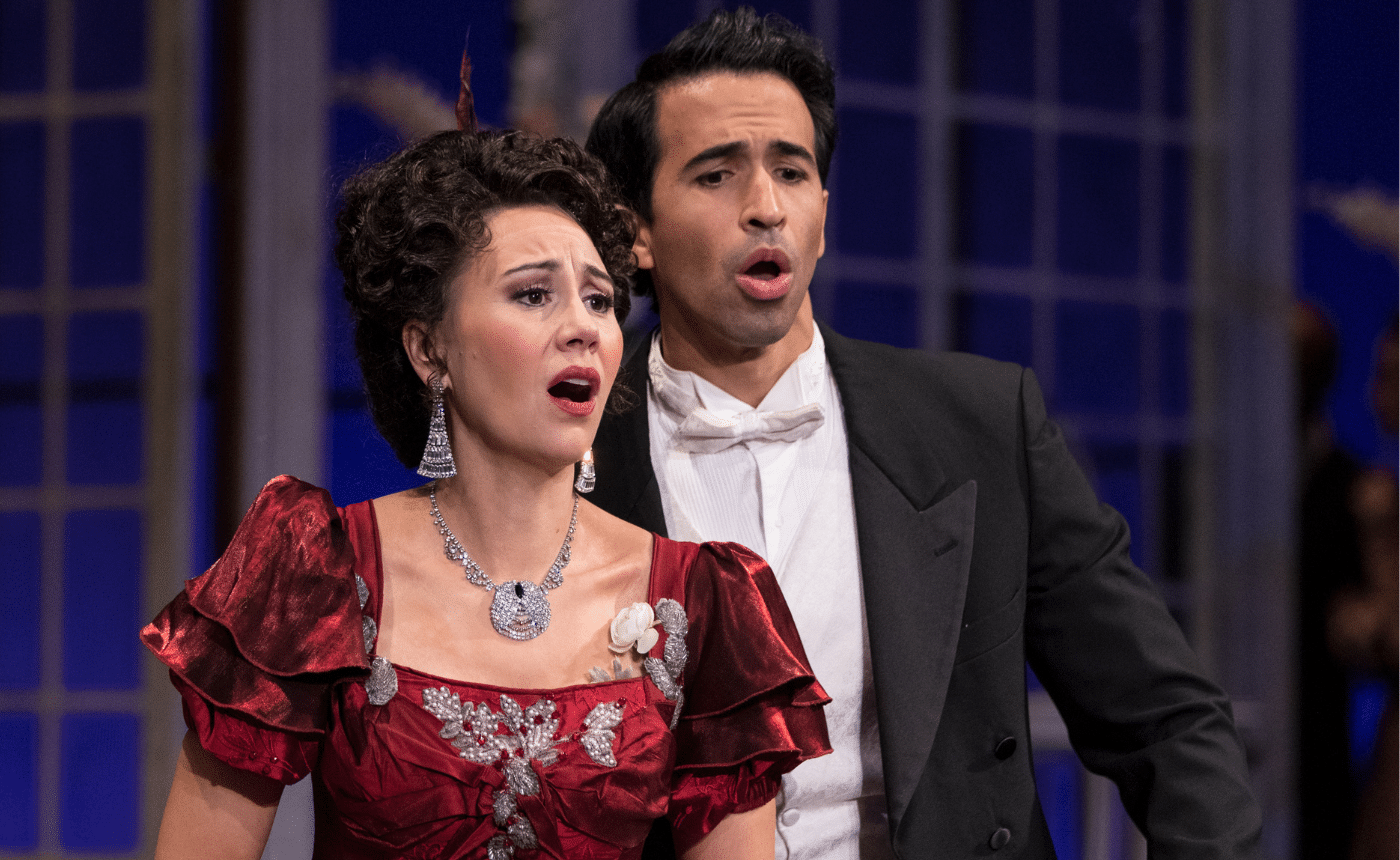The Creators of Carmen: Georges Bizet
COMPOSER
GEORGES BIZET (1838 – 1875)
Many music-lovers, asked to name some compositions by Georges Bizet, will hem and haw after they’ve mentioned Carmen. You are at least 100% more knowledgeable if you attended Utah Opera’s production of The Pearl Fishers (Les Pêcheurs de perles) at the Janet Quinney Lawson Capitol Theatre in January 2015. Some of you may have gone to the cinema, a year later, to see the Metropolitan Opera’s new production, and it must have struck you as surprising to learn that a century ago the opera merited a mere three performances, despite a star-studded cast which included Enrico Caruso.
But Bizet is much more than Spanish gypsies and fishermen in Ceylon, the former name of Sri Lanka. Let’s investigate!

Utah Opera’s “The Pearl Fishers” Photo: Kent Miles
Les Pêcheurs de perles was commissioned by Léon Carvalho for his independent (i.e. not state subsidized) Théâtre Lyrique. In 1862 Carvalho had been offered, as a sort of retiring gift by the Minister of Fine Arts, an annual grant of 100,000 francs, on the condition that he produce, each year, a three-act opera by a recent Prix de Rome winner who had not had an opera professionally produced. Carvalho must have been aware of Bizet’s pre-Prix reputation, especially that the eighteen-year-old student at the Paris Conservatoire had won first prize in a competition organized, in 1856, by Jacques Offenbach (famous/notorious for Orpheus in the Underworld, with it infectious Can-Can; and familiar to Utah Opera audiences who remember La Belle Hélène in 1993 and Tales of Hoffmann in 1989); and that Bizet’s one-act Le docteur Miracle had been produced at Offenbach’s Théâtre des Bouffes-Parisiennes in 1857. Carvalho must also have been aware that, post-Prix, Bizet was on the verge of ineligibility, since the Opéra-Comique (which was required by its government subsidy to produce an opera by a recent winner of the Prix de Rome), had already, early in 1862, begun rehearsals of Bizet’s La guzla de l’Émir. Luckily for Cavalho, his offer to Bizet of the libretto of Les Pêcheurs encouraged the composer to withdraw the guzla score from the Opéra-Comique and nothing, as far as we know, has been heard from it since, though some of the music may have been recycled into later works.
But we must back-track to the Prix de Rome. Louis XIV established the prize in 1663 to subsidize French painters and sculptors while they lived and studied for a maximum of five years in Rome. Music was added to the mix in 1803, with the stipulation that the winning composer submit to the French committee a new composition each year to justify the government grant. As you might expect from a government-run competition, the list of unknowns far outnumbers those who subsequently composed anything worth remembering! Hector Berlioz (the composer of Symphonie fantastique and La Damnation de Faust) was awarded the prize in 1830 – after 6 attempts! Ambroise Thomas, the composer of Mignon and of a much-maligned Hamlet, won it in 1832. Seven years of nonentities led to Gounod’s (Faust and Roméo et Juliette) award in 1839. Eighteen years later, in 1857, the award went to Georges Bizet.

Charles Gounod
Who was born in Paris in 1838. Music was in his genes: both parents were musicians, though his mother had a more respectable background as a pianist than his father, who had given up his career as a hairdresser/wigmaker to become a teacher of singing. Georges proved such a prodigy that he was admitted to the Paris Conservatoire two weeks before he had reached the minimum age, which was 10. Within six months he had won a first prize in sight-singing, which so impressed the retired, and gloriously-named, Pierre-Joseph-Guillaume Zimmermann, that he took on the boy as a private composition student. At the tender age of fourteen Bizet was awarded a first prize for piano: the kid was no slouch! Zimmermann introduced him to his son-in-law Charles Gounod, and it’s safe to say that son-in-law had a more profound influence on the young composer than father-in-law! Bizet prepared a reduction for four-hands-at-one-piano of Gounod’s opera La nonne sanglant and also of his First Symphony, which inspired the seventeen-year-old to try his own hand as a symphonist. The resulting score was lost for almost eighty years and was first performed only in 1935. There are various performances available on youtube, but whichever one you listen to, I think you’ll be astonished by the sheer precociousness of this teenage genius. Zimmerman died in 1853 and Bizet enrolled in the composition class of another gloriously-named Professor: Jacques François Fromental Élie Halévy.
The 20-year-old Prix de Rome winner arrived in Rome in January 1858. The composition he sent to the French committee at the end of his first year showed he respected neither tradition nor rules. A setting of the Catholic Mass text was expected. Bizet, instead, gave them Don Procopio, a two-act comic opera set to an Italian libretto. Luckily they liked it. The following year, he rejected various opera projects, abandoned two tries at a symphony and one at a symphonic poem; he suggested a choral work to the people in Paris: a setting of a Latin text by Horace, in praise of Apollo and Diana. The young man’s head was always full of ambitious projects, most of which never materialized. The committee was happy to receive his 1859 submission: Vasco da Gama, a symphonic poem. His plan, approved by Paris, to stay a third year in Italy instead of going to Germany, was thwarted by the news that his mother was seriously ill; his return to Paris did not absolve him from his annual contribution to the committee, though the three orchestral pieces he eventually submitted had been delayed by his family crisis. His final submission was the one-act opera La guzla de l’émir.

Utah Opera’s The Pearl Fishers Photo: Kent Miles
And now we’re back (scroll back four paragraphs!) to Les Pêcheurs de perles, which was first performed at the Théâtre Lyrique on September 30, 1863. Neither critics nor audiences were enthusiastic, though Hector Berlioz considered that it did the composer “the greatest honor” – high praise indeed from one of the best music critics at that time, who also happened to be one of the greatest composers ever! I think it’s safe to say that when Utah Opera produced the opera in January 2015, we in the audience agreed with Berlioz’s assessment; it has its problems, both musical and dramatical, but it’s not as bad as the history books lead us to believe.
His Prix de Rome subsidy having expired, and knowing he could not survive by composition alone, Bizet set about earning a living as a musician by taking on piano and composition students; by accompanying rehearsals and auditions (how familiar that sounds!); by preparing piano-vocal scores (reducing the orchestral score of an opera or choral work so it can be played on the piano, while keeping the vocal lines, with the text, intact); by making piano transcriptions of many operas (which reduced orchestra and voice to something which could be played at home by any amateur pianist). He even attempted music criticism: his first contribution to a journal led to a quarrel with the editor, and he resigned.
You know that Bizet considered many projects at the same time, and that most of them never came to fruition. A case in point: Ivan IV. In January 1856, the administrator of the Paris Opéra had offered Charles Gounod a libretto by François-Hippolyte Leroy, for production later that year. Gounod was enthusiastic, but for some reason, the production was abandoned. In 1862 Gounod offered the libretto to his younger colleague. Pêcheurs intervened. The Théatre Lyrique was to produce Ivan late in 1865, but production delays there prompted Bizet to offer the score to the Paris Opéra, who rejected it. With no production in sight, Bizet abandoned the score and gave himself over to Carvalho’s latest proposal in 1866: La jolie fille de Perth, which was finally produced in December 1867.
“Gave himself over” – not quite! In the year between signing the contract for La jolie fille and its production, Bizet composed assorted piano pieces and songs. Those songs, whenever they were written: glorious! He also worked on a symphony he subtitled Roma, with each movement a musical description of various Italian cities: Rome, Venice, Florence and Naples. He wasn’t satisfied and kept tinkering with it, never settling on a final version. He did “give himself over” to what seems like an insane proposition: a 4-act operetta, with each act composed by a different composer. The mélange appeared on December 13, 1867; Bizet’s act was reported as “stylish…distinguished.”
Less than two weeks later, critics acknowledged that La jolie fille, which received its first performance at the Théâtre Lyrique on December 26, showed an improvement over Pêcheurs – one went so far as to hail it as a masterpiece. Most of them condemned the libretto, an adaptation of Walter Scott’s novel, and Winton Dean, a noted Bizet scholar, considered it the worst the composer had been given. There were 18 performances, and probably there could have been more had not Carvalho over-extended himself by taking on the management of another theatre which led to bankruptcy.
Bizet ploughed on. He entered various competitions, but his submissions went nowhere. He revised Roma, which was performed in 1869. He considered, and rejected, various operatic subjects, though he started work on two of them. In June of 1869 he married Geneviève, the daughter of his former composition professor, Jacques Fromental Halévy, and set about finishing Noé, the opera his father-in-law had left unfinished at this death in 1862; he did complete it towards the end of 1869, but the opera was not performed until 1885, and then only in Karlsruhe. Perhaps this is as good a place as any to note that the Ludovic Halévy who co-wrote the libretto for Le docteur Miracle, Bizet’s first operatic success, and who would later write, with Meilhac, the libretto for Carmen, was first-cousin to Geneviève.
Life in Paris, including that of the musical and theatrical variety, came to a halt with the outbreak of the Franco-Prussian War in July 1870. Some of you will remember that the resulting siege of Paris delayed the premiere of Verdi’s Aida in Cairo. With the return of normality in the summer of 1871, Bizet was appointed Chorus-Master at the Paris Opéra, but, for reasons that are not at all clear, he lasted only a month. He resumed work on his pre-war operatic projects, one of which seemed destined for production at the Opéra-Comique, until, as so often happened with Bizet, destiny decided against it. But the year was not a complete compositional desert. Jeux d’enfants is a delightful set of a dozen pieces for four hands at one piano, five of which he orchestrated. Djamileh was produced in May, 1872, at the Opéra-Comique as part of a triple bill of one-act operas. Its companions were La princesse jaune, the first staged opera by Camille Saint-Saëns (who went on to write Samson et Dalila; various orchestral tone-poems and concertos; and three Symphonies, the last of which is known as his “Organ Symphony”) and Le Passant by Émile de Paladilhe (both opera and composer virtually unknown these days). After eleven performances of what seems to have been a production badly staged and dismally sung, France ignored the opera for some sixty years: admittedly a one-act opera is difficult to slot into an Opera House’s schedule, and it was seventeen years before Sweden staged it in 1889; Rome saw it the following year. Gustav Mahler introduced it to Hamburg in 1892 and, as Chief Conductor of Vienna’s Hofoper (today’s Staatsoper), conducted 19 performances there over a five-year period. Richard Strauss also admired the score.
Carvalho did not lose faith in the young composer and commissioned him to write music for a play he was producing at the Vaudeville Theatre. It was L’Arlésienne, by Alphonse Daudet, which opened on October 1, 1872. The music was considered too complex for the drama, but Bizet arranged four of the numbers into an Orchestral Suite, which was a success in the concert hall the following month. Footnote (if we had such things!): Daudet’s play was the basis of Francesco Cilea’s L’arlesiana, which premiered at Milan’s Teatro Lirico in November, 1897; we know the opera today only from its haunting tenor aria “È la solita storia del pastore.” And if we recognize Cilea’s name at all, it’s as the composer of Adriana Lecouvreur (1902), a well-crafted piece beloved by sopranos “of a certain age,” though only they can command a production, which is a pity: the opera is better than its leading lady!
The poor reception of Djamileh did not deter the directors of the Opéra-Comique – Adolphe de Leuven and Camille du Locle – from commissioning from Bizet, at some time in the future, a full-length opera to a libretto by Ludovic Halévy and Henri Meilhac. Subject undecided. Which could not even be considered until after the Opéra-Comique’s revival of Gounod’s Roméo et Juliette, scheduled for January 1873. The composer, still in London (he had moved there at the outbreak of the recent war), expressed full confidence in Bizet’s ability not only to prepare, musically, the production, but also to incorporate the various revisions made after its first production in 1867. This required composing additional measures; re-composing others; and orchestrating those “new” sections.
The Opéra’s production of Gounod’s Faust in 1869 – a decade after its premiere at the Opéra-Comique – required an added ballet; Léo Delibes is credited with that music. (You balletomaniacs know Delibes as the composer of the delightful scores for Coppélia and Sylvia. His opera Lakmé is known today only by its duet for soprano/mezzo – which British Airways used for its TV commercials some years ago – and for its heroine’s display “Bell Song,” beloved by high-flying coloratura sopranos of an age gone by!). In 1873, after his work on the Roméo revisions, the Opéra called on Bizet to revise (mostly shorten) Delibes’ original ballet music. He was happy to do that and ignore the Opéra-Comique’s open-ended commission, because Jean Faure, the principal baritone at the Opéra, suggested to the management that Bizet write an opera for the Opéra. The result was Don Rodrigue, which was based, he emphasized, on an early seventeenth-century Spanish play, Las Mocedades del Cid, by Guillén de Castro, and not on Le Cid, the more familiar version (to the French) by Pierre Corneille, the great French dramatist, who based his play on de Castro’s original in 1637. The vocal lines of the new opera were complete enough in early October 1873 for Bizet to sing (badly) through the score to Faure and others associated with the Opéra. But his dream of a production there went up in smoke when the theatre did on October 28. Had the title role been written for a baritone, Faure might have pushed the re-located management to commission the completed, fully-orchestrated score. But it wasn’t, and he didn’t.
Bizet was now free to return to the Opéra-Comique. Henri Meilhac and Ludovic Halévy, well-known as the librettists for Jacques Offenbach’s string of successes, would provide the libretto. To the consternation of Adolphe de Leuven, one of the co-directors of the Opéra-Comique, Bizet insisted that his opera be based on Prosper Mérimée’s short story Carmen, which was first published, in three chapters, in 1845; a fourth was added in 1846, and the “final” version, which included that fourth chapter, was published in 1847. The opera had its first performance on March 3, 1875. The reviews were, for the most part, lukewarm and Bizet considered it a failure; which failure, we are told, led to Bizet’s premature death. Not exactly so.
Various ailments – respiratory problems, throat infections, some kind of rheumatism – had been constant companions for much of Bizet’s life, and they can only have been exacerbated by over-work. Yes, he was depressed by the critical reception of Carmen: hardly surprising, given the energy he had given not only to its composition, but also to its rehearsal process. The day before he died, he signed a contract for its production the following October (a mere six months later), at Vienna’s Hofoper, which would require the original dialogue to be turned into sung recitative. And there is evidence he planned to do that himself – though I’ve read nothing about who would condense the dialogues into recitatives. In addition, he was already planning his next composition: Geneviève de Paris, and sat in on some of César Franck’s organ classes at the Conservatoire in early 1875 to learn something of the (to him) unfamiliar world of sacred choral music. In May he received the final text of the oratorio just before he left with his family for Bougival, a village on the river Seine north-west of Paris, which seems to have been a favorite resort of artists, for the great singer Pauline Viardot had a house there, as did Ivan Turgenev, her Russian lover; and both Monet and Renoir painted scenes from the surrounding area. On May 29, Bizet enjoyed a swim in the river. Two days later he had a heart attack, followed by another, on June 3, which killed him. He was buried two days later in Paris. The planned recitatives for performances in Vienna, and beyond, not to mention the proposed Geneviève, do not suggest a composer wilting under the criticisms of a Parisian press for whom he had, anyway, little respect. It seems to me more likely that Bizet, after his vacation at Bougival, planned to return home refreshed and excited to work on his upcoming projects. The tragedy for him is that he didn’t; the tragedy for us is that he didn’t. Who knows the effect Bizet would have had on French music as a whole, and French opera in particular, had he lived his biblically-ordained four-score and ten years. But then we could raise the same lament for Mozart (35); Schubert (31); Mendelssohn (38); and many others.
©Paul Dorgan




